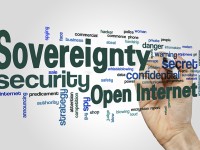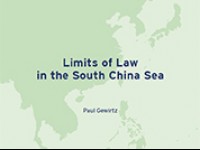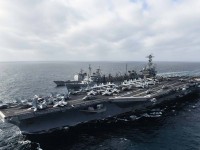
Wang Hanling, Director of National Center for Ocean Affairs and the Law of the Sea
Jun 15, 2016
China has been consulting and cooperating with ASEAN nations on the South China Sea issue following the “dual track” approach under corresponding regional and bilateral legal frameworks. The US, by maintaining a lonely existence beyond the international maritime legal order, will eventually isolate itself by attempting to isolate China.
Zhou Bo, Senior Fellow, Center for International Security and Strategy, Tsinghua University
Jun 07, 2016
No nuclear-weapon states have given up efforts in modernizing their arsenals, although for different reasons. A commitment of no-first-use is defensive in nature, but it doesn’t exclude nuclear retaliation. Such a pledge doesn’t cripple other countries’ nuclear capabilities: It boosts confidence that a world free of nuclear weapons is eventually possible.

Rogier Creemers, Research Officer, Programme for Comparative Media Law and Policy
Jun 07, 2016
Norms, or generally accepted modes of behaviour, have provided a quicker and more flexible approach than international law for governing actions in cyberspace. While both China and the United States have begun discussing such behaviour in terms of international law, it currently seems unlikely that an agreement, or even trust, will be reached in the near future.

Paul Gewirtz, Potter Stewart Professor of Constitutional Law and Director, the Paul Tsai China Center
Jun 01, 2016
Although a rules-based and law-based approach in the international arena is an admirable aspiration, law will not solve the dangerous problems in the South China Sea. More specifically, the upcoming ruling in the case brought by the Philippines against China before an arbitration tribunal under the U.N. Convention the Law of the Seas will not solve the problems or even make a major headway in resolving them. An examination of the issues before the tribunal and its most likely decisions demonstrate that the tribunal and law can make only a very limited contribution to resolving the South China Sea crisis. Law will not save us from continuing to focus predominantly on negotiations and power politics.
Zhao Weibin, Researcher, PLA Academy of Military Science
Jun 01, 2016
To predict, prevent and manage crises, especially those triggered by third-party factors, should become the top priority in China-U.S. strategic consultations, in order to establish higher levels and broader scopes of risk-prevention and control mechanisms.
Jin Liangxiang, Senior Research Fellow, Shanghai Institute of Int'l Studies
May 31, 2016
China regards both the U.S. and Iran as important partners, which is why Beijing played a major role in putting together the Iran nuclear deal. Implementing that plan will face challenges in both the U.S. and Iran, and China’s commitment to building a new type of major-country relationship with the US means it will continue to assist both countries to keep the deal moving forward.
Richard Weitz, Senior Fellow, Hudson Institute
May 27, 2016
The U.S. decision to remove all restrictions on arms sales to Vietnam does not aim to militarize the South China Sea dispute or contain China. Rather, the decision was but the latest move among the great powers to pursue their interests in Southeast Asia, which for the United States focus on discouraging China or anyone else from using military power to pursue a coercive solution to territorial conflicts.
Ben Reynolds, Writer and Foreign Policy Analyst in New York
May 27, 2016
In a recent editorial, the New York Times accuses China of “playing chicken” in the South China Sea, which as Benjamin Reynolds argues, dramatically inflates the threat that China poses to the region and the United States. The critique is not militarism, threatening behavior, or the revision of international norms as such. Rather, the narrative outlined by the Times is the standard hawkish U.S. narrative about China and the South China Sea, which have preceded invasions in Vietnam, Iraq, and bombing in Libya, too.
Tian Shichen, Founder & President, Global Governance Institution
May 23, 2016
The recent U.S. reconnaissance activities in South China Sea raises the question if another collision is looming in the air. After examining the existing international conventions and laws regarding airspace and maritime encounters, the author argues that the key to preventing another collision is for the U.S. to stop close-in reconnaissance operations near China’s waters.

Joan Johnson-Freese, Professor, US Naval War College
May 19, 2016
Whereas aircraft carriers have long provided the U.S. naval primacy as floating islands, China is creating its own artificial islands, complete with deep channels, harbors, berthing areas and airfields, all manned by thousands of troops, to counter that primacy. The consequences of a military clash could easily be disastrous and must be avoided. The politics of keeping the overall U.S.-China relationship on track is a particular challenge in the U.S. during a presidential election year, when candidates are posturing to an unexpectedly populist electorate.
Back to Top

- China-US Focus builds trust and understanding between the U.S. and China through open dialogue among thought leaders.
- Our Offerings
- Topics
- Videos
- Podcasts
- Columnists
- Research Reports
- Focus Digest
- Stay Connected
-
Thanks for signing up!
- Get the latest stories from China-US Focus weekly.